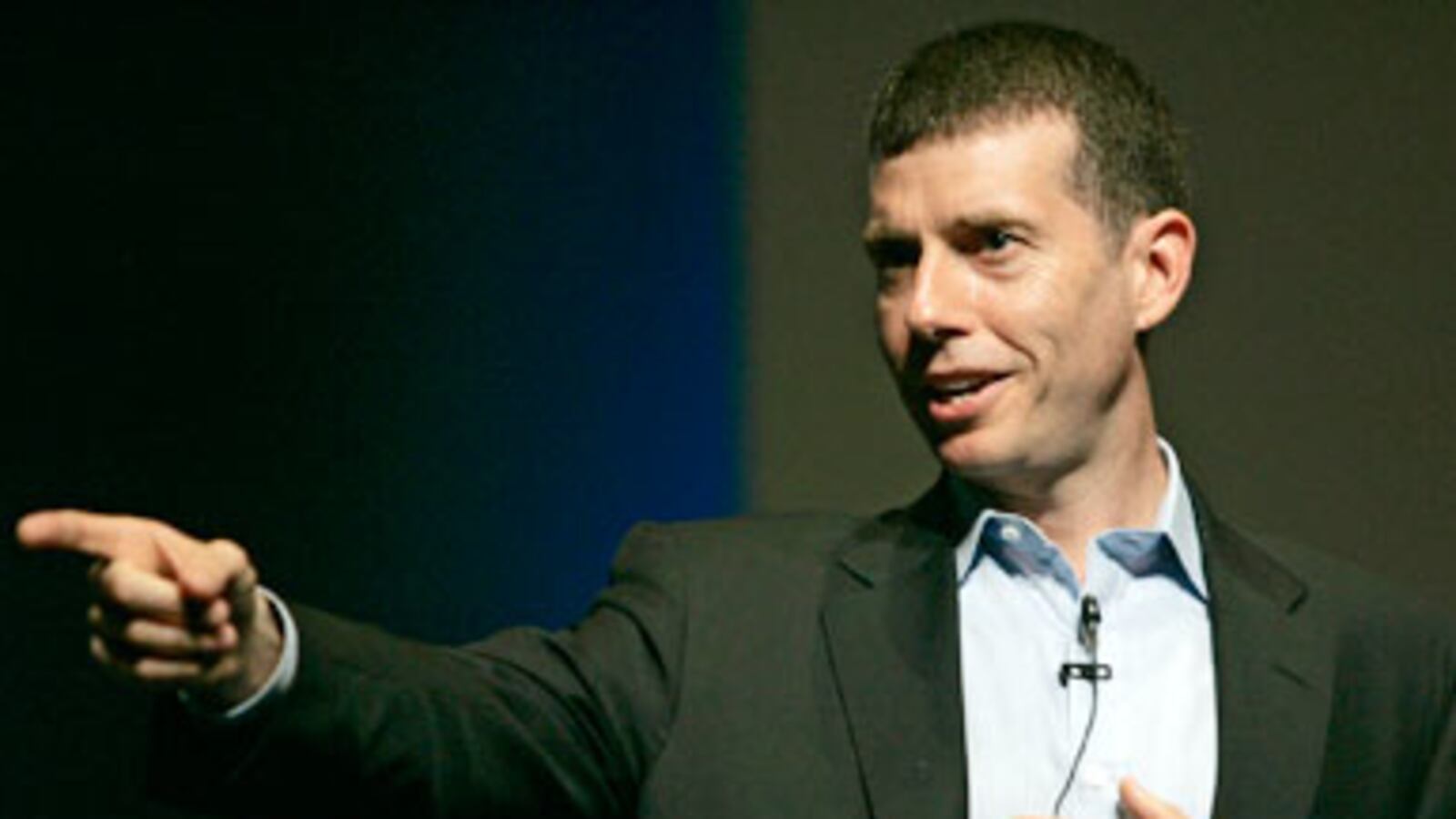David Plouffe, the brains behind the president's 2008 campaign, joins a revamped White House on Monday. Daniel Stone talks to top advisers about Plouffe's cool style, occasional tantrums, and hefty to-do list.
The first time Barack Obama asked David Plouffe to work for him, Plouffe almost said no. It was December of 2006 and Obama, weighing a presidential run, had begun to imagine his inner circle.
"The most important role I need to fill is campaign manager," Obama told Plouffe in the senator's Chicago home, before offering the job. Plouffe, a seasoned, although rusty, campaign operative had a small child, and he and his wife wanted to have another soon. Plus, it seemed to Plouffe—as well as most people at the time—that the candidate was running "with little more than hope in his sails," he has since recalled. But he did it anyway.
The second time Obama asked Plouffe to work for him, he did say no. After Obama's election, the campaign manager who orchestrated the victory explained to the president-elect that he'd spend some time on the outside. The president could use a strategist and unofficial adviser somewhere outside the White House complex to call when he needed a fresh opinion. Maybe, Plouffe told him, he'd come to work in the White House after the midterms.
Now, during the biggest shake-up of his president's administration—including new chief of staff Bill Daley, a handful of new economic advisers, and a new press secretary expected soon—Plouffe will reunite with his former boss today as a senior adviser. The strategist, who has split his time between Chicago and Washington, will take the baton from outgoing counselors David Axelrod and Robert Gibbs, marking Obama's pivot toward the 2012 campaign.
"David Plouffe will be one of the people coming in who I think is going to bring a great deal of leadership and direction to the communications operation and the political operation here," Axelrod says. That communications operation during the campaign was a production of Plouffe and Axelrod, but the wheels seemed to fall off once Obama took office. Two years later, Axelrod and Gibbs have conceded that at times the messaging was sloppy, even as they blame the economic calamity they inherited in 2009.

Plouffe's task, in many ways, is an old one: He'll reach out to the party base and reacquaint the president with minority and women voters, and the much-valued youth vote, that initially swept him into office. But the 2012 campaign will be complicated by Obama's list of accomplishments, most of which—from health care to financial reform—are complex packages that can be obtuse to explain.
Following the midterm shellacking, young voters turned out to be the most elusive demographic—and they may be central to Obama's reelection. "I worry about young people," says Howard Dean, former chairman of the Democratic National Committee. "Many wanted to see big change and I don't think they did."
Campaign staffers recall Plouffe as cool, calm and even, says one, "bizarrely stoic."
According to several officials, Plouffe won't do much actual governing. Unlike Karl Rove, who engaged deeply in political matters for the Bush administration, or Dick Morris, who coined the hands-on "triangulation" strategy for President Clinton, several staffers said Plouffe will resemble neither. "His skill set is more mechanics of politics," says one senior staffer. "He's not going to be a policy adviser." (Plouffe declined, through a spokesman, to be interviewed for this story.)
That might be for the best, because the way former campaign colleagues tell it, Plouffe doesn't get lost in the weeds. Like his boss, he also doesn't get caught up in dramatics. On the campaign trail, says former Obama spokeswoman Linda Douglass, "David and the president were both temperamentally and behaviorally in sync. They really had this great ability to listen to what others were saying and to communicate in a way that was understood."
During one of the most trying moments of the campaign—the surfacing of inflammatory sermons from Obama's former pastor Jeremiah Wright—several campaign staffers recall Plouffe as cool, calm and even, says one, "bizarrely stoic."
No campaign manager, of course, could always keep his cool. There were times that Plouffe misfired or lost his temper over the usual rigors of campaign life. When the McCain team announced Sarah Palin as the ticket's running mate, Plouffe fired off a nasty memo, uncharacteristic of the campaign's No Drama operation, that dinged Palin's lack of experience, and undercut Obama's argument that experience wasn't all that mattered. Several weeks before the election, Plouffe got into a testy exchange with White House chief of staff Josh Bolten, who was pressured by McCain to invite him and Obama to a meeting with President Bush about the bank bailouts.
Plouffe is expected to move into the office currently occupied by Axelrod on the south side of the building. Two staffers that he'll bring with him will sit in the building's inner, windowless center.
One of his first tasks will be to help find a replacement for Gibbs. Then he's expected to spend lots of time working with the Democratic National Committee and Organizing for America, the advocacy wing (that morphed out of the Obama for America campaign) that ran Obama's successful my.barackobama.com campaign portal—and went largely silent after the inauguration.
But finding out more about Plouffe's day to day activities may prove difficult. In the press office, one staffer laughs at the idea that Plouffe will talk to reporters, or do many live TV interviews on the North Lawn, like Gibbs, Axelrod and economic adviser Austan Goolsbee have frequently done. A Pouffe mantras during the campaign was that he only mingles with reporters "when it serves a purpose."
With hefty access to the president, his purpose in the West Wing will be to rebrand Obama as a messenger of hope and change. He's got his work cut out for him.





